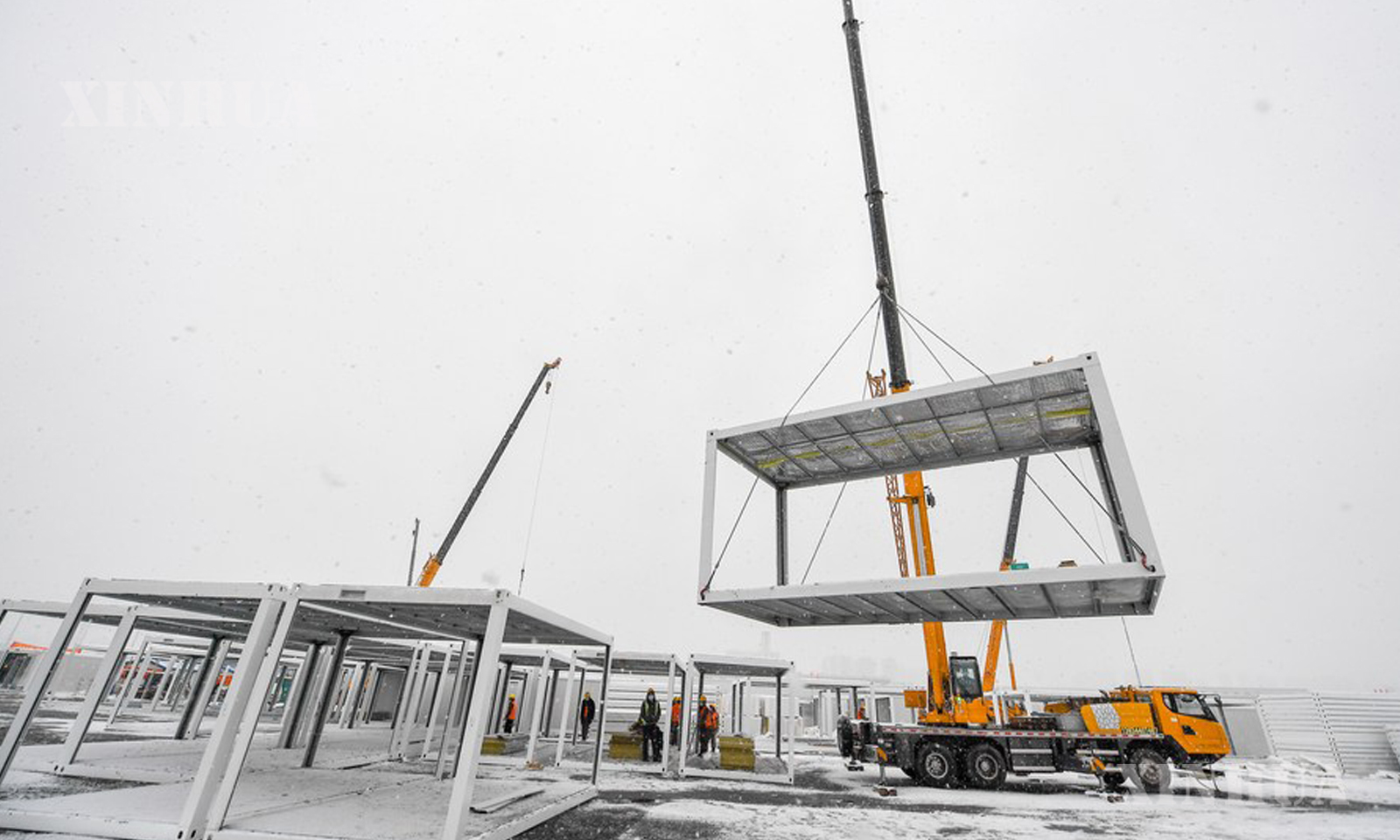ASEAN
အိုမီခရွန်ဗိုင်းရပ်စ်ကို တိုက်ဖျက်ရန် အဆောတလျင်၊ တင်းတင်းကျပ်ကျပ် ဆောင်ရွက်မည်

ပေကျင်း၊ မတ် ၁၇ ရက် (ဆင်ဟွာ)
ရောဂါကာကွယ်ရေးနှင့် ထိန်းချုပ်ရေး ဆောင်ရွက်ချက်များကို ဆောလျင်စွာဆောင်ရွက်ထားနိုင်လေ၊ ပိုမိုလျင်မြန်စွာ ဖြန့်ကျက်ထားနိုင်လေဖြစ်ပြီး တင်းကျပ်မှုများ ပိုမိုဆောင်ရွက်လေ၊ ရောဂါပျံ့နှံ့မှုပိုမိုမြန်ဆန်သော အိုမီခရွန် မျိုးဗီဇပြောင်းဗိုင်းရပ်စ်အား ထိန်းချုပ်ကိုင်တွယ်နိုင်လေဖြစ်ကြောင်း တရုတ်ကျွမ်းကျင်ပညာရှင်များက ပြောကြားခဲ့သည်။
တရုတ်နိုင်ငံတွင် လက်ရှိဖြစ်ပွားနေသော ကိုဗစ် (COVID) ကူးစက်မှုလှိုင်း၏နောက်ကွယ်ရှိ အဓိကတရားခံမှာ Omicron BA.2 မျိုးဗီဇကွဲဗိုင်းရပ်စ်ဖြစ်ကြောင်း၊ ယင်းဗိုင်းရပ်စ်မှာ ဒယ်လ်တာ (Delta) မျိုးဗီဇပြောင်းထက် ပိုမိုကူးစက်လွယ်ကြောင်း တရုတ်နိုင်ငံ ရောဂါထိန်းချုပ်ရေးနှင့် ကာကွယ်ရေးစင်တာ၊ ရောဂါပိုးမွှားဗေဒအကြီးအကဲ Wu Zunyou က ပြောကြားခဲ့သည်။
Omicron BA.1 ဗိုင်းရပ်စ်သည် ဒယ်လ်တာမျိုးဗီဇပြောင်းဗိုင်းရပ်စ်ထက် ၇၇ ရာခိုင်နှုန်း ပိုမိုကူးစက်မြန်ဆန်ကြောင်း၊ BA.2 က BA.1 ထက် ၆၆ ရာခိုင်နှုန်း ပိုမိုကူးစက်မြန်ကြောင်း ဆက်စပ်သော ရလဒ်များအား ကိုးကား၍ Wu က မှတ်ချက်ပြုခဲ့သည်။
အရေးပါသော ကာကွယ်ဆေးထိုးနှံမှု လွှမ်းခြုံခြင်းနှင့်အတူ ရောဂါကူးစက်ခံရသူများသည် ရောဂါလက္ခဏာအနည်းငယ်သာ ပြသလျက်ရှိပြီး ဗိုင်းရပ်စ်က မသိသာဘဲ ပျံ့နှံ့လျက်ရှိကြောင်း၊ ယင်းမှာ ယခုရောဂါကူးစက်မှုလှိုင်း၌ ကူးစက်ရောဂါတိုက်ဖျက်ရေး ကြိုးပမ်းအားထုတ်မှုများအတွက် စိန်ခေါ်မှုများ ဖြစ်စေခဲ့ကြောင်း Wu က ဆိုသည်။
တရုတ်နိုင်ငံသည် လက်ရှိတွင် ပြည်တွင်း ရောဂါကူးစက်မှုများမှ ဖိအားမြင့်တက်လျက်ရှိကြောင်း အမျိုးသား ကျန်းမာရေးကော်မရှင် (NHC) ၊ ရောဂါထိန်းချုပ်ရေးနှင့် ကာကွယ်ရေးဌာနခွဲ၊ ဒုတိယအကြီးအကဲ Lei Zhenglong က ပြောခဲ့သည်။ ပြည်တွင်းကူးစက်မှုအနေဖြင့် နိုင်ငံအတွင်း ဒေသများစွာ၌ အစုလိုက်အပြုံလိုက် ရောဂါကူးစက်မှုများ ကျယ်ကျယ်ပြန့်ပြန့်၊ မကြာခဏ ဖြစ်ပွားလျက်ရှိသည်ဟု ဆိုသည်။
ကမ္ဘာလုံးဆိုင်ရာ ကိုဗစ်-၁၉ ရောဂါ (COVID-19) ဖြစ်ပွားမှု စတုတ္ထလှိုင်းမှာ အဓိအားဖြင့် အိုမီခရွန် (Omicron) ကြောင့်ဖြစ်ကြောင်းနှင့် မျိုးဗီဇပြောင်းဗိုင်းရပ်စ်၏ ခြေသံလုံခြင်းနှင့် ကူးစက်မှုမြင့်မားသော သဘောသဘာဝကြောင့် ဖြစ်ကြောင်း ၎င်းက ပြောခဲ့သည်။
ထို့ပြင် တရုတ်နိုင်ငံ၏ တက်ကြွသော ကိုဗစ်ကင်းစင်ရေးမူဝါဒ (zero-COVID policy) နှင့် ထိန်းချုပ်မှုဆောင်ရွက်စီမံမှုများက အိုမီခရွန်ဗိုင်းရပ်စ် တိုက်ဖျက်ရာတွင် ထိရောက်မှုရှိသည်ကို သက်သေပြလျက်ရှိကြောင်း ကျွမ်းကျင်သူများအဆိုအရ သိရသည်။
ကူးစက်ရောဂါသည် ကျီလင်၊ ဆန်းတုန်း၊ ရှန်ဟိုင်းနှင့် ကွမ်တုန်း စသည့်နေရာများ၌ ဖြစ်ပွားလျက်ရှိသလို လျောင်နင်၊ စီချွမ်း၊ ဟူပေနှင့် ကျန်းဆူးတို့၌ ထိရောက်စွာထိန်းချုပ်နိုင်ပြီဖြစ်ကြောင်းနှင့် အတွင်းမွန်ဂိုးလီးယားဒေသတွင်မူ ရောဂါကူးစက်မှုပြီးဆုံးလုနီးပါးရှိပြီဖြစ်ကြောင်း Lei က ဆိုသည်။
ထို့ပြင် လုပ်ငန်းအဖွဲ့များကိုလည်း လမ်းညွှန်မှုများ ပံ့ပိုးဆောင်ရွက်ရန် စေလွှတ်ထားပြီးဖြစ်ကြောင်း၊ အချို့ဒေသများ၌ ရောဂါပိုးတွေ့ရှိမှု လက္ခဏာများရှိခြင်းနှင့်အတူ ရောဂါတုံ့ပြန်ရေးဆောင်ရွက်ချက်များမှာလည်း အစီအစဉ်တကျ၊ တက်တက်ကြွကြွ ရှေ့ဆက်လုပ်ဆောင်လျက်ရှိကြောင်း သိရသည်။
အားကောင်းသော ပုံမှန်ကာကွယ်မှုနှင့် ထိန်းချုပ်မှု ဆောင်ရွက်ချက်များက ဗိုင်းရပ်စ်တိုက်ဖျက်ရေး ကြိုးပမ်းအားထုတ်မှုများကို ဦးစားပေးနေရာ၌ ဆက်လက်ထားရှိနေဆဲဖြစ်ကြောင်း Lei က ဆိုသည်။
ဆိပ်ကမ်းဝင်ရောက်မှု၊ နယ်စပ်နေရာများနှင့် စာသင်ကျောင်းများနှင့် ဘိုးဘွားရိပ်သာများကဲ့သို့ အခြေခံအဆောက်အအုံများကို အလေးထားဆောင်ရွက်လျက်ရှိကြောင်း သိရသည်။
တရုတ်နိုင်ငံတွင် မတ်လမှစ၍ ကိုဗစ်-၁၉ ရောဂါ မကြာခဏပြန်လည်ဖြစ်ပွားမှုကို ကြုံတွေ့နေရသည်။ ပြည်နယ်အဆင့်ဒေသပေါင်း ၂၈ ခုတွင် ရောဂါကူးစက်လျက်ရှိသည်။
တရုတ်နိုင်ငံ ပြည်မကြီးတွင် မတ် ၁၅ ရက်က ဒေသတွင်းရောဂါကူးစက်မှုအသစ် ၁,၈၆၀ ဦးရှိကြောင်း NHC အချက်အလက်အရ သိရသည်။ ယင်းနေ့တွင်ပင် ရောဂါကုသမှုခံယူနေသော လူနာ ၁၃,၇၈၀ ဦးရှိကြောင်း၊ သို့ရာတွင် သေဆုံးသူအရေအတွက်မှာမူ ၄,၆၃၆ ဦးဖြင့် မပြောင်းမလဲရှိနေကြောင်း သိရသည်။ (Xinhua)
…………………………………………
(English Version)
Earlier, stricter measures to fight Omicron
Source: Xinhua
Editor: huaxia
2022-03-16 20:32:12
BEIJING, March 16 (Xinhua) — Prevention and control measures should be in place earlier and deployed more quickly, and be stricter and more tangible, given that the stealthy Omicron sub-variant spreads quicker, said Chinese experts.
The main culprit behind the ongoing wave of COVID infections in China is the Omicron BA.2 sub-variant, which is more contagious than the Delta variant, said Wu Zunyou, chief epidemiologist with the Chinese Center for Disease Control and Prevention.
The Omicron BA.1 spreads 77 percent faster than the Delta variant, while BA.2 circulates 66 percent faster than BA.1, Wu noted, citing relevant research results.
Together with the significant coverage of vaccination, with infected people showing few symptoms and spreading the virus unconsciously, this has posed challenges to the anti-epidemic efforts in this wave of infections, said Wu.
Lei Zhenglong, deputy head of the disease control and prevention division of the National Health Commission (NHC), said China has recently been under increasing pressure from inbound cases. Domestically, the country has seen cluster infections in multiple regions spread widely and taking place frequently.
He cited the influence of the fourth wave of global COVID-19 outbreaks, mainly attributed to Omicron, and the stealthy and highly transmissive nature of the variant.
So far, China’s dynamic zero-COVID policy and containment measures have proved effective against Omicron, according to the experts.
While the epidemic is evolving in Jilin, Shandong, Shanghai, and Guangdong, it has been put under effective control in Liaoning, Sichuan, Hubei, and Jiangsu, and come almost to an end in Inner Mongolia, said Lei.
Task forces have been sent to provide guidance. Response measures are pressing forward orderly and vigorously, with positive signs in some regions.
Strengthened regular prevention and containment measures remain a priority in these efforts to fight the virus, said Lei.
Ports of entry, border areas, and primary facilities such as schools and nursing homes are the focus.
China has experienced frequent resurgence of COVID-19 since March. There are infections in 28 provincial-level regions.
NHC data show that the Chinese mainland Tuesday reported 1,860 new local cases. There were 13,780 patients under treatment on the day, but the death toll has remained unchanged at 4,636. ■
Photo : Workers assemble quarantine units amid snow at the construction site of a COVID-19 quarantine center in Jilin City, northeast China’s Jilin Province, March 15, 2022. (Xinhua/Zhang Nan)






